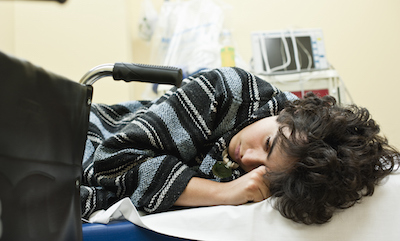After Massachusetts Policy Change, Homeless Children Seek Shelter at ER.
 In 2012, Massachusetts implemented new restrictions in its emergency assistance program, which provides shelter and other services to homeless families with children and pregnant women. One of the restrictions requires most families to have stayed in “a place not meant for human habitation” to be eligible for shelter.
In 2012, Massachusetts implemented new restrictions in its emergency assistance program, which provides shelter and other services to homeless families with children and pregnant women. One of the restrictions requires most families to have stayed in “a place not meant for human habitation” to be eligible for shelter.
Now, a new study co-authored by a School of Public Health researcher finds hundreds of homeless children visited a pediatric emergency department in Boston to fulfill that requirement, with their stays costing more than if they had simply been sheltered.
The study, published in the American Journal of Public Health, found a nearly nine-fold increase in the number of visits for homelessness at the emergency department of Boston Medical Center (BMC). The visits averaged almost $200 each, 97 percent paid by Medicaid, compared to the $130 the state’s emergency assistance program spends to shelter a family for a night.
“This change in state policy appears to have had an unintended consequence of more families coming to our emergency departments,” says senior author Megan Sandel, associate professor of environmental health at SPH and associate professor of pediatrics at the School of Medicine. “This study highlights the need to develop better homeless diversion services, and the need to invest in new affordable housing.”
The researchers reviewed de-identified electronic medical records of homeless children and young adults 0-21 years old who sought shelter at the BMC emergency department between September 1, 2011, and August 31, 2016. They identified 1,078 visits for homelessness by 916 children and young adults during that period.
Before the 2012 policy change, the median number of these visits per month was three. After the policy change, the median rose to 17 visits per month. The total hospital charges were $578,351, with a net payment of $214,231, 97 percent paid by Medicaid. The average stay was eight hours, totaling more than 8,500 hours of occupancy.
For comparison, the researchers wrote, the state’s emergency assistance program spends about $130 to shelter a family for one night. “Medicaid payments to our hospital would have funded1,594 shelter nights,” the authors wrote.
The study was co-authored by Robert Vinci, professor and chair of pediatrics at MED. The other co-authors were Mia Kanak and Amanda Stewart of Boston Children’s Hospital and Harvard Medical School, and Shanshan Liu of Boston Children’s Hospital.